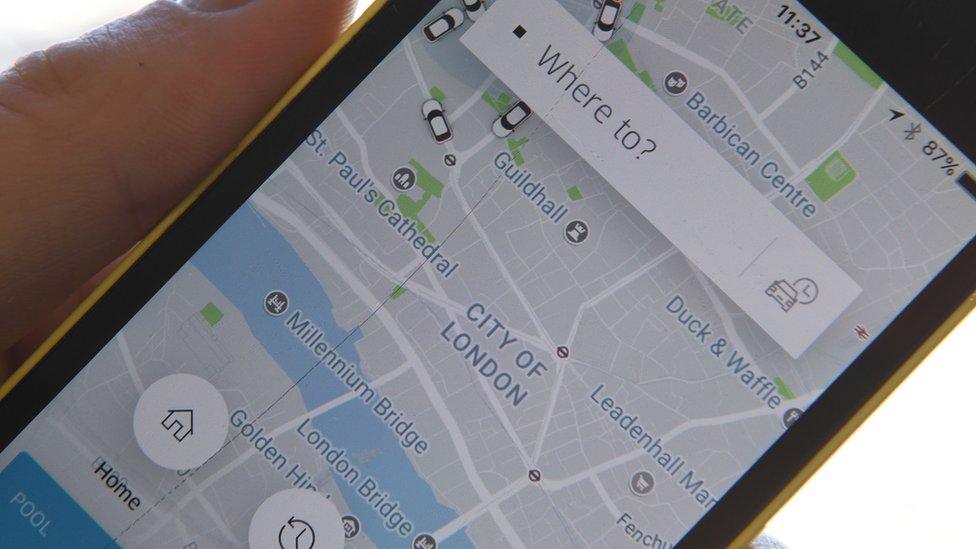Uber London licence: 'Direct anger at firm' says mayor
- Published
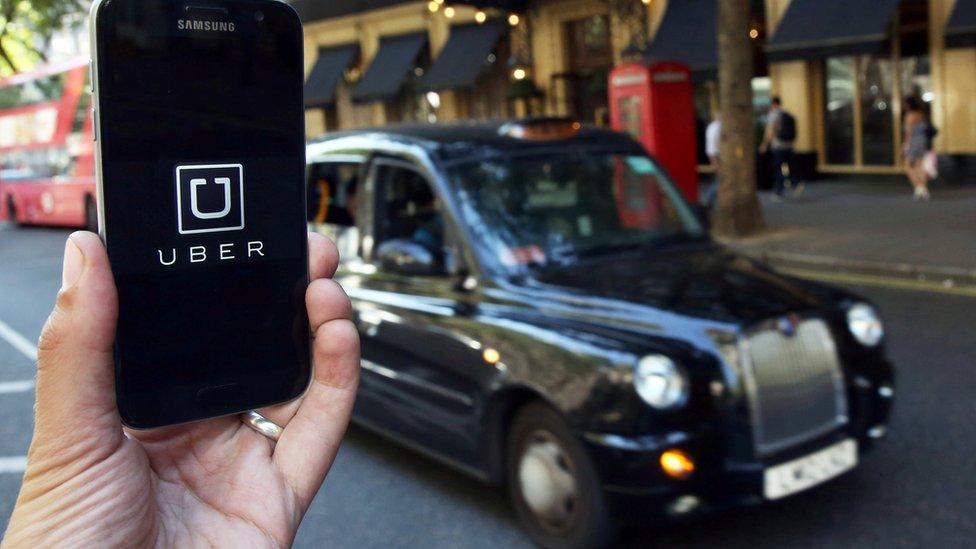
Some 3.5 million passengers and 40,000 drivers use the Uber app in London
London Mayor Sadiq Khan says anger from customers and drivers over Uber losing its licence should be directed at the company.
More than 500,000 people have signed a petition, started by Uber, to urge Transport for London (TfL) to reverse its decision not to renew the licence.
TFL said Uber could not hold a private hire operator licence on the grounds of "public safety and security".
The ride-hailing app firm said it would appeal against TfL's decision.
The petition says: "If this decision stands, it will put more than 40,000 licensed drivers out of work and deprive millions of Londoners of a convenient and affordable form of transport."
TfL's concerns include Uber's approach to carrying out background checks on drivers and reporting serious criminal offences.
Uber's licence is due to expire on 30 September.
It has 21 days to appeal and can continue to operate while any appeals are ongoing.
Reacting to the petition reaching more than 500,000 signatures, Mr Khan said: "I know that Uber has become a popular service for many Londoners - but it would be wrong for TfL to licence Uber if there was any way this could pose a threat to Londoners' safety or security.
"As mayor of London I welcome innovative new companies that help Londoners by providing a better and more affordable service - but providing an innovative service is not an excuse for not following the rules."
Drivers and passengers react to news that Uber's licence in London will be revoked
Fred Jones, Uber's UK head of cities, said the mayor and TfL had "caved to pressure from a small number of individuals and groups that want to protect the status quo and reduce consumer choice and competition from London".
He said the company had operated in London for five-and-a-half years, during which it was audited by TfL.
"The last time they audited us to check we were playing by the rules, they found that there were zero errors in our processes.
"This was one of the strange things around the TfL notice yesterday is they are the ones who do all of the checks and license the drivers."
He said when a driver signed up to the app, Uber made sure they had all the correct paperwork from TfL and that Uber did not carry out background checks itself.
In a message to staff, Uber's chief executive Dara Khosrowshahi said: "It's worth examining how we got here. The truth is that there is a high cost to a bad reputation.
"It really matters what people think of us."
'Knew the rules'
Kajal Odedra, UK director at Change.org, said it was "the fastest growing petition we've seen in the UK this year".
"The speed with which this grew shows how powerful online campaigning can be."
She said the petition showed how quickly the voices of citizens could become part of the debate between governments and corporations.
Petitioner Glenn Gathercole, from London, said he added his signature because: "Uber provides a much-needed alternative to minicabs and black cabs. It is more efficient, safer and economical than the alternatives."

Uber reaction around England
Brighton: Local MP Caroline Lucas said Uber's business model was "irresponsible to the core" and that it needed to improve passenger safety so that it could get its licence back
Bristol: The city council says it would "keep an eye on the outcome" of the dispute with TfL
Cambridge: The council will "look closely" when it comes to renew Uber's current licence which will expire in December, reports Cambridge News, external
Manchester: Uber Britania - a separate company to Uber London - is licensed until 2021
Nottingham: Uber has a licence until 2020, and the council has "no intention" to review it any earlier
Woking: The borough council says it follows different licensing practices to TfL and has brought in a new strict criminal convictions policy

And Twitter user @Gabbysalaza_ said, external she was "annoyed" at the decision as Uber allowed her to get out of "uncomfy" situations if out at night.
Others have said that the ruling was within the company's control.
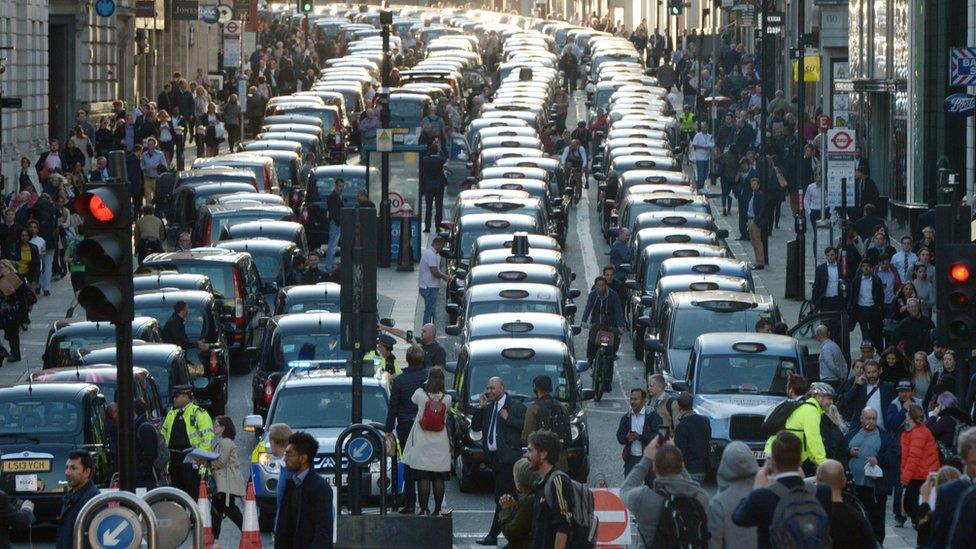
In 2015, hundreds of black cab drivers held a protest against Uber
"Uber knew the rules. TFL asked them to comply with the rules. Uber refused. What is TFL supposed to do?" said political commentator Owen Jones, external.
Danielle Louise wrote on Twitter, external: "Londoners are literally more outraged at the loss of Uber than the fact women are being sexually assaulted in fake taxis."
'London is closed'
Conservative MP and minister for London Greg Hands said, while the company must address safety concerns, Mr Khan was threatening to leave users "stranded" and put thousands out of work.
Uber has said the move "would show the world that, far from being open, London is closed to innovative companies".
But Labour leader Jeremy Corbyn said TfL was there to "protect all of us and I think they are doing the right thing".

Analysis: From BBC technology correspondent Rory Cellan-Jones
Throughout its short, tempestuous life, Uber has clashed with regulators around the world - and more often than not it has come out on top.
Its tactic has often been to arrive in a city, break a few rules, and then apologise when it's rapped over the knuckles. Some regulators have backed down, others have run the company out of town.
In London, despite protests from angry taxi drivers, the company has had a relatively easy ride until now.
But a wave of bad publicity about its corporate culture, its lax attitude to checks on its drivers and its treatment of this freelance army seems to have spurred TfL into action.
Make no mistake, Uber will use every legal avenue to fight this ban. It will argue that consumers, in the shape of the millions of mainly young Londoners who rely on its service, will be seriously let down if it can no longer operate.
But the courts will have to balance that with the serious concerns about public safety raised by TfL.

Some 3.5 million passengers and 40,000 drivers use the Uber app in London.
Wes Streeting, chair of the All Party Parliamentary Group on Taxis, says the blame lies with Uber for not following the rules.
"You cannot have a situation where, however big the customer base or however big the driver base, an operator that's providing a service like this in a city like ours can simply flout rules and regulations and on things as serious as criminal records checks for their own drivers, and this goes to the heart of passenger safety."

Uber controversies
Chief executive Travis Kalanick, who helped found the company in 2009, resigned in July following a series of scandals and criticism of his management style
In June, 20 staff were sacked after a law firm investigated specific complaints made to the company about sexual harassment, bullying, and retaliation for reporting problems
At the start of 2017, the firm paid £16.2m ($20m) in the US to settle allegations it gave false promises to drivers over how much they would earn
In October 2016 Uber lost a landmark employment tribunal in the UK that ruled drivers should be classed as workers rather than being self-employed
A few months later Uber announced it would offer English courses, financial advice and introduce an appeals panel for its UK workers after facing criticism over lack of support and rights for its drivers
In 2014 the New Delhi government banned app-based taxi companies after an Uber driver raped a passenger in his vehicle
Uber stopped operating in Austin, Texas, when it was told drivers would have to have fingerprint background checks, but it reinstated its services after the requirement was ended

- Published23 September 2017

- Published22 September 2017
- Published22 September 2017
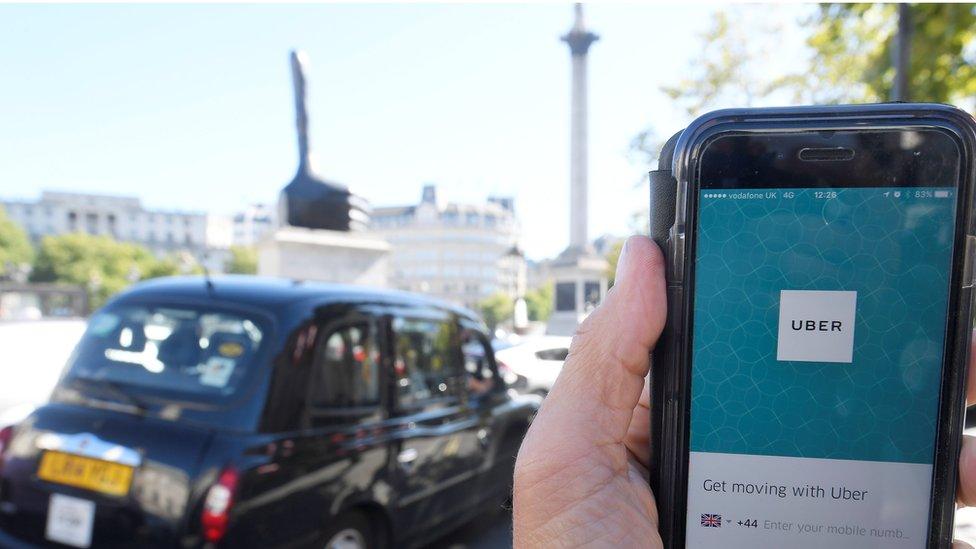
- Published22 September 2017
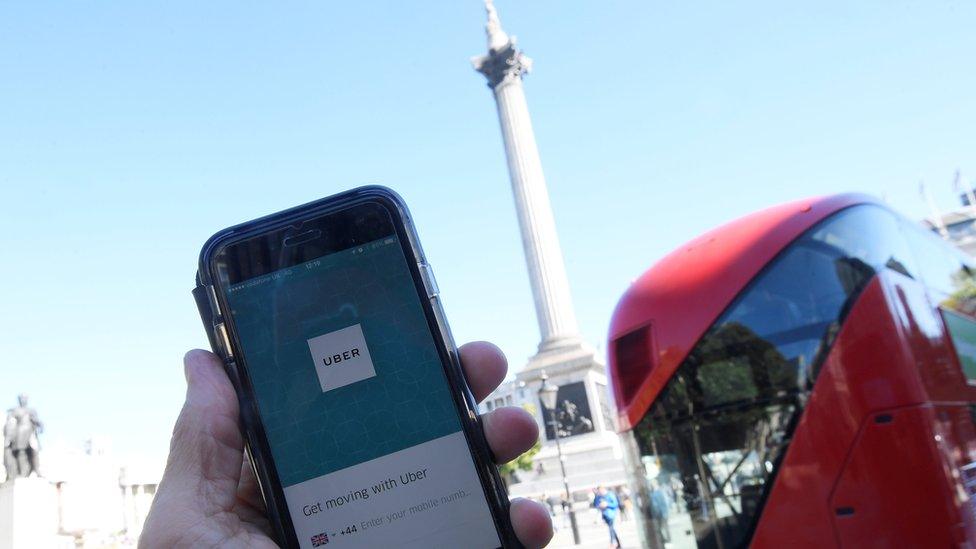
- Published22 September 2017
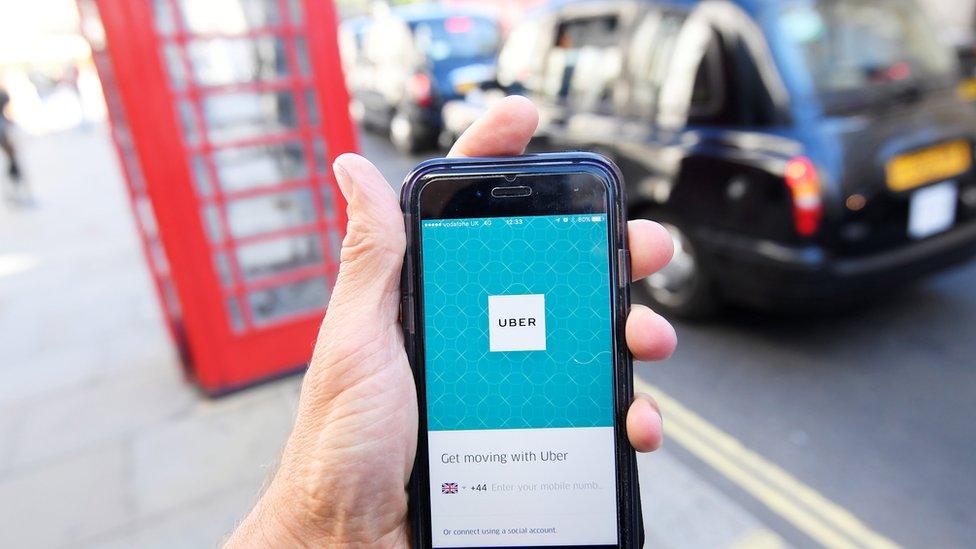
- Published22 September 2017
